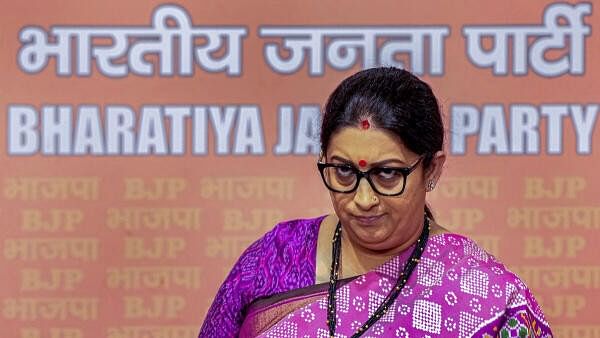
Women and Child Development Minister Smriti Irani.
Credit: PTI Photo
New Delhi: The ability of a child below the age of 6 months to watch a toy as it moves, or whether a child between the age of 6 months and a year can respond appropriately to their own name, or if a child between a year and a half and 2 years can use a straw appropriately are some of the parameters that will be used to screen disabilities in anganwadis.
The Anganwadi Protocol for Divyang Children was released on Tuesday by Union Minister of Women and Child Development Smriti Irani.
Under this protocol, anganwadi workers will assess all children for delays in their developmental milestones and screen them for early signs and symptoms. If any disability is found, the families of these children will receive support and referrals, and Anganwadi workers will help them with new activities to stimulate their senses, the ministry said.
Unveiling the protocols, Irani said that this will mark “a silent revolution” in our local communities. “We know 85 per cent of a child’s mental development happens by the age of 6. Our education system now has new provisions for divyang children. We will also have specialised training for the anganwadi women in the near future,” Irani said.
Over 8 crore of the country’s 14 crore children below the age of six attend an anganwadi, Irani said. She added that 4.35 crore children among them are in the age group of 3-6 years, and receive hot-cooked meals and early childhood care. Additionally, 4.5 crore children below 3 years receive take home ration (THR) and home visits.
“Till November, 16 crore home visits have been done by Anganwadi workers, and in the last four months alone, anganwadi workers from over 13 lakh AWCs have done 7 crore home visits. The estimate is that this move will benefit over a lakh divyang children,” Irani said.
The protocol is a three-step process – in the first step, a child is screened for symptoms and parents are counselled, in the second step Visual, Auditory, Kinesthetic and Tactile (VAKT) activities are used for a multi-sensorial engagement, and in the third step anganwadi workers help parents access benefits for PwDs if a child shows consistent delays.
As per the 2011 Census, over 20.42 lakh children below the age of 6 years suffer disabilities, accounting for 7 per cent of the child population in the country. With the Rights of Persons with Disabilities Act, 2016 recognising 21 disabilities, the number of children with disabilities is set to increase. The Department of People with Disabilities under the Union Ministry of Social Justice and Welfare notes that “early intervention can provide specialized support and services for infants and young children at risk or with disability”.
A third of most disabilities in India can be prevented if they are caught early enough and adequately addressed, the DEPwD’s data shows.